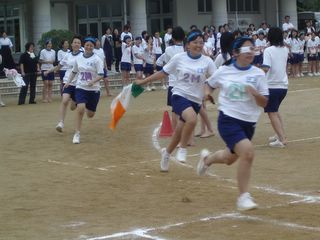Empire of Denial
By MIKE MARQUSEE (Counterpunch)
The US maintains military bases in 140 foreign countries (needless to say, there are no foreign military bases on US territory). Thanks to exorbitant military spending more than the combined total of the 32 next most well-armed nations - the US enjoys a unique and coercive global reach, a monopoly which it intends to preserve at all costs, as the current National Security Strategy makes clear. The US claims and exercises a prerogative to topple other regimes and occupy other countries that it denies to all other nation-states. Through the IMF, WTO and World Bank, it shapes the economic destinies of most people on the planet. The fact is that the fate of billions living beyond US borders is determined by decisions made in Washington.
Yet, we are told, this is not an empire. True, the US prefers indirect over direct rule; its domination is exercised, for the most part, through military and commercial alliances, rather than outright conquest. But empires of the past have also used these methods. What really makes the US different is the persistence and in most cases the sincerity of its imperial denial.
(snip)
The history of denial is as long as the history of intervention and that goes back to the first decades of the republic, when US forces engaged in military action to protect US shipping in the Mediterranean, the Caribbean, Sumatra and Peru. In US foreign policy, respect for the sovereignty of others has always come second to commercial interests. By the end of the 19th century, the US had annexed Hawaii, along with dozens of smaller islands across the Pacific, and used military force to secure a foothold in the markets of China and Japan.
When it prised the Philippines, Cuba and Puerto Rico from the dying Spanish empire in 1898, the US declared "a new day of freedom" in these "liberated" lands. Filipinos took the rhetoric seriously and rebelled against the imposition of US rule. After more than a decade of brutal counter-insurgency, a quarter of a million Filipinos had been killed, and 4200 Americans. This was ten times the number of Americans killed in the brief Spanish-American War. Yet US history textbooks routinely assign far more space to the latter than the former.
America, Woodrow Wilson declared, was "the only idealistic nation in the world". He proclaimed "national self-determination" as the cornerstone of a new world order, but deployed US military forces overseas more frequently than any of his predecessors: against Mexico, Haiti, the Dominican Republic, Cuba, Panama, Nicaragua and the nascent Soviet Union.
Thanks to history textbooks, Hollywood, television and politicians (Democrat and Republican), the US people are kept in ignorance of their imperial past. Each intervention is presented as an altruistic response to a crisis. Since there is no American empire, no pattern, habit or system of extra-territorial domination, the motive for each intervention is assessed at face value. Somehow the principles of liberty and human happiness always seem magically to coincide with American national self-interest or, more precisely, the economic interests of the US elite.
(snip)
Opposition to foreign domination is not an emotional spasm. It is grounded in history and experience and the balance of probabilities (not least the probability that the imperial power will place its own interests before those of the people it rules). The rationalisations and even the forms of empire change but the underlying reality does not. Decisive power, military and economic, remains in the hands of a distant elite.
Whether it's talk of "empire lite" or Bush-style unilateralism, you can hear the drumbeat of the old American exceptionalism, the claim that the US has a unique destiny and that this destiny embodies the fate of humankind. History has taught peoples in many lands to fear the USA's altruism. In a poem from the early 1920s entitled 'The Evening Land', DH Lawrence wrote:
I am so terrified, America,
Of the iron click of your human contact.
And after this
The winding-sheet of your selfless ideal love.
Boundless love
Like a poison gas.
Opinion pieces, travel articles, places and people; lots of poetry; commentary on current events and history and whatever else shows up on the radar. Articles have been numbered (since Sept. 2004). Go n-eiri an t-adh leat.
Monday, October 31, 2005
Saturday, October 29, 2005
227. After the Rising
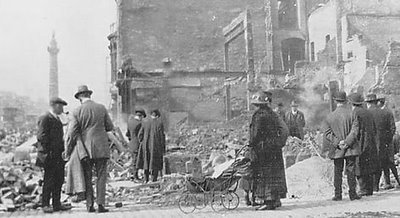
We picked our way through the rubble
on Friday evening, myself and my sister,
stepping over the broken tramlines
on O'Connell Steet, shaking our heads
at the shell-damaged buildings,
two females, silenced and appalled.
It seemed as though
nothing was left: the city
we had loved and lived in
was gone. It was destroyed.
"God's curse on these people
for the trouble they have caused",
said my sister, Dervla, petulantly,
she was trembling, walking by my side.
"God's curse on the bloody English"
said a voice which was my own.
"May God curse and blast
every single one of them,
every bloody bitches
bastard mother's son!"
Dervla sprang away from me
as well she might
shocked and scandalised
her mouth hanging open
(never before had she heard such language)
my genteel and proper sister.
Next day I went to work for the rebels
who had no other name,
not in those days, and a young fellow
breezed in from an English
prison, that would be 1917,
and ran me off my feet.
"Miss O'Grady", he said,
"you will take a memo, please,
and I want copies of the previous letter
with suitable amendments
typed and legible for my signature
by 5 o'clock this evening".
"Yes, Mr. Collins", I said,
"and would you mind very much
if I was just a little bit late
returning this afternoon?
It's just that the sales are on
at Brown Thomas in Grafton Street".
"Miss O'Grady, you astonish me.
Do you propose to gambol and play,
to disport yourself, to sling
about your hard earned shillings
(God knows how little I pay you)
in mercantile British corridors?"
Well, there was no answer to that.
I glared at him, furiously,
as he unleashed his wide and sunny grin.
Sunday, October 23, 2005
226. October in Ireland (2003)
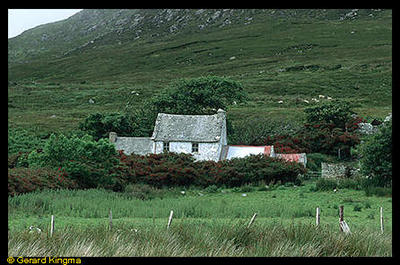
The rain spatters
viciously
on the double-glazed windows
when the evening
draws in, so we pull across
the curtains, lay
some more of those Bord na Mona
turf briquettes
upon the spitting, hissing
crackling fire, then nurse
our fiery drams
in Waterford tumblers,
listening to but half ignoring
the shriek
and whistle of the wind.
"I don't know," says Uncle Liam
"how much of this you can understand."
Upstairs
in this whitewashed cottage
planted, perversely
on the edge
of nearly nowhere
sits a four-poster bed
with sagging springs
in a room
no longer used nor visited
occupied now
by dust and sepia photographs
wherein
began the genesis
the procreative urges
of an ongoing family tragedy.
The lashing rain, the heartless wind
derides our humanity.
Now as in times past
and in the coming times to be
it mocks our hopes
our aspirations
our nationality.
Pain, turbulence, famine, grief.
On the bedroom wall
housed in an ancient frame
is a faded stitching sampler
"God Bless Our Happy Home"
piously, but uncertainly
accomplished, by her own hand,
by Emily May MacCarthy
on October 20, 1843,
the fifth of eleven children
and one of the seven
who starved to death
along with her despairing parents.
Other photographs of gentlemen
wih large moustaches
stare into the unforgiving lens
with comical expressions
of puzzled defiance,
arranged in front of studio
backdrops, and very
tasteful potted palms.
--James Boyle Roche. Photographer.
15 Bridge Street. Ennis --
is stamped within an oval
in the corner: the address
still exists, I went to have a look,
it is now a fast-food restaurant.
Wedding couples
equally unrelaxed, stare
across the years of mutual
incomprehension: I could not
even begin
to talk to these people.
He sits, she stands,
but she places a tentative
pleading hand
upon his rigid farming shoulder.
A history of unhappiness.
But there's another
strangely out-of-place picture
of my great-uncle Marteen Rua
the red-haired boy
shot dead in the civil war
a cocky 19-year-old
with a cheeky grin
brandishing
an enormous revolver
and with a paparoosi cigarette
dangling from his left jaw.
I can tell from the look of him
we could have had a drink,
we could have had a talk, he cuts through
all the lace-curtain piety
the respectability
the fear: he looks
so modern, so devil-me-care.
But the rain will have none of it:
it comes down in buckets
it comes down in cascades.
You will never never never,
you will never never be free, it says:
in this country you will never
never be released from the past.
Liam is uncharacteristically
subdued, even embarrassed: he shifts
from foot to foot, in front
of the warm and blazing fire.
We are warmed outside
and inside, too
thanks to the single malt.
Upstairs
there are more old photographs
here and there
on the dresser and on the sideboards:
cloche hats on smiling elegant women,
charabancs, baggy suits
on the gents, who grin and squint
in the harsh sunlight
of long forgotten days,
some of them sporting
those ridiculously
shortened neckties: my unknown
recent ancestors.
A flicker of empathy
of understanding
runs through
this threnody of regret.
"Listen, I think I'm going to bed,
it's been a really long day," I say.
Liam frowns. An awkward
silence ensues: " Emmmm ...
Listen to me. There's something
I really need to tell you.
It's about the family .... "
Don't.
It will keep for another hundred years.
Thursday, October 20, 2005
225. I wanted to slap him ....!
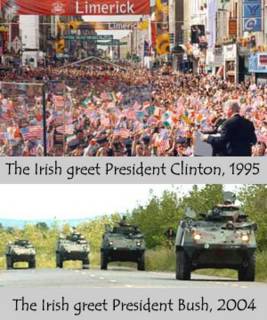
Carole Coleman's interview with President Bush for Irish television
“Is that how you do it in Ireland — interrupting people all the time?”
I froze. He was not happy with me and was letting me know it.
“Yes,” I stuttered, ....
10/09/05 "Sunday Times" -- -- (excerpt)
Mr President,” I began. “You will arrive in Ireland in less than 24 hours’ time. While our political leaders will welcome you, unfortunately the majority of our people will not. They are annoyed about the war in Iraq and about Abu Ghraib. Are you bothered by what Irish people think?”
The president was reclining in his seat and had a half-smile on his face, a smile I had often seen when he had to deal with something he would rather not.
“Listen. I hope the Irish people understand the great values of our country. And if they think that a few soldiers represent the entirety of America, they don’t really understand America then . . . We are a compassionate country. We’re a strong country, and we’ll defend ourselves. But we help people. And we’ve helped the Irish and we’ll continue to do so. We’ve got a good relationship with Ireland.”
“And they are angry over Iraq as well and particularly the continuing death toll there,” I added, moving him on to the war that had claimed 100 Iraqi lives that very day. He continued to smile, but just barely.
“Well, I can understand that. People don’t like war. But what they should be angry about is the fact that there was a brutal dictator there that had destroyed lives and put them in mass graves and torture rooms . . . Look, Saddam Hussein had used weapons of mass destruction against his own people, against the neighbourhood. He was a brutal dictator who posed a threat that the United Nations voted unanimously to say, Mr Saddam Hussein . . .”
Having noted the tone of my questions, the president had now sat forward in his chair and had become animated, gesturing with his hands for emphasis. But as I listened to the history of Saddam Hussein and the weapons inspectors and the UN resolutions, my heart was sinking. He was resorting to the type of meandering stock answer I had heard scores of times and had hoped to avoid. Going back over this old ground could take two or three minutes and allow him to keep talking without dealing with the current state of the war. It was a filibuster of sorts. If I didn’t challenge him, the interview would be a wasted opportunity.
“But, Mr President, you didn’t find any weapons,” I interjected.
“Let me finish, let me finish. May I finish?”
With his hand raised, he requested that I stop speaking. He paused and looked me straight in the eye to make sure I had got the message. He wanted to continue, so I backed off and he went on. “The United Nations said, ‘Disarm or face serious consequences’. That’s what the United Nations said. And guess what? He didn’t disarm. He didn’t disclose his arms. And therefore he faced serious consequences. But we have found a capacity for him to make a weapon. See, he had the capacity to make weapons . . .”
I was now beginning to feel shut out of this event. He had the floor and he wasn’t letting me dance. My blood was boiling to such a point that I felt like slapping him. But I was dealing with the president of the United States; and he was too far away anyway. I suppose I had been naive to think that he was making himself available to me so I could spar with him or plumb the depths of his thought processes. Sitting there, I knew that I was nobody special and that this was just another opportunity for the president to repeat his mantra. He seemed irked to be faced with someone who wasn’t nodding gravely at him as he was speaking.
“But Mr President,” I interrupted again, “the world is a more dangerous place today. I don’t know whether you can see that or not.”
“Why do you say that?”
“There are terrorist bombings every single day. It’s now a daily event. It wasn’t like that two years ago.”
“What was it like on September 11 2001? It was a . . . there was relative calm, we . . .”
“But it’s your response to Iraq that’s considered . . .”
“Let me finish. Let me finish. Please. You ask the questions and I’ll answer them, if you don’t mind.”
His hand was raised again as if to indicate that he was not going to tolerate this. Again, I felt I had no choice but to keep quiet.
“On September 11 2001, we were attacked in an unprovoked fashion. Everybody thought the world was calm. There have been bombings since then — not because of my response to Iraq. There were bombings in Madrid, there were bombings in Istanbul. There were bombings in Bali. There were killings in Pakistan.”
He seemed to be finished, so I took a deep breath and tried once again. So far, facial expressions were defining this interview as much as anything that was said, so I focused on looking as if I was genuinely trying to fathom him.
“Indeed, Mr President, and I think Irish people understand that. But I think there is a feeling that the world has become a more dangerous place because you have taken the focus off Al-Qaeda and diverted into Iraq. Do you not see that the world is a more dangerous place? I saw four of your soldiers lying dead on the television the other day, a picture of four soldiers just lying there without their flak jackets.”
“Listen, nobody cares more about death than I do . . .”
“Is there a point or place . . .”
“Let me finish. Please. Let me finish, and then you can follow up, if you don’t mind.”
By now he was getting used to the rhythm of this interview and didn’t seem quite so taken aback by my attempt to take control of it. “Nobody cares more about death than I do. I care a lot about it. But I do believe the world is a safer place and becoming a safer place. I know that a free Iraq is going to be a necessary part of changing the world.”
The president seemed to be talking more openly now and from the heart rather than from a script. The history lesson on Saddam was over. “Listen, people join terrorist organisations because there’s no hope and there’s no chance to raise their families in a peaceful world where there is not freedom. And so the idea is to promote freedom and at the same time protect our security. And I do believe the world is becoming a better place, absolutely.”
I could not tell how much time had elapsed, maybe five or six minutes, so I moved quickly on to the question I most wanted to ask George Bush in person.
“Mr President, you are a man who has a great faith in God. I’ve heard you say many times that you strive to serve somebody greater than yourself.”
“Right.”
“Do you believe that the hand of God is guiding you in this war on terror?”
This question had been on my mind ever since September 11, when Bush began to invoke God in his speeches. He spoke as if he believed that his job of stewarding America through the attacks and beyond was somehow preordained, that he had been chosen for this role. He closed his eyes as he began to answer.
“Listen, I think that God . . . that my relationship with God is a very personal relationship. And I turn to the Good Lord for strength. I turn to the Good Lord for guidance. I turn to the Good Lord for forgiveness. But the God I know is not one that . . . the God I know is one that promotes peace and freedom. But I get great sustenance from my personal relationship.”
He sat forward again. “That doesn’t make me think I’m a better person than you are, by the way. Because one of the great admonitions in the Good Book is, ‘Don’t try to take a speck out of your eye if I’ve got a log in my own’.”
I suspected that he was also telling me that I should not judge him.
I switched to Ireland again and to the controversy then raging over the Irish government’s decision to allow the use of Shannon Airport for the transport of soldiers and weapons to the Gulf.
“You are going to meet Bertie Ahern when you arrive at Shannon Airport tomorrow. I guess he went out on a limb for you, presumably because of the great friendship between our two countries. Can you look him in the eye when you get there and say, ‘It will be worth it, it will work out’?”
“Absolutely. I wouldn’t be doing this, I wouldn’t have made the decision I did if I didn’t think the world would be better.”
I felt that the President had now become personally involved in this interview, even quoting a Bible passage, so I made one more stab at trying to get inside his head.
“Why is it that others don’t understand what you are about?”
He shrugged. “I don’t know. History will judge what I’m about.”
I could not remember my next question. My mind had gone completely blank. The president had not removed me from his gaze since we had begun and I wanted to keep up the eye contact.
If I diverted to my notes on the table beside me, he would know he had flustered me. For what seemed like an eternity, but probably no more than two seconds, I stared at him, searching his eyes for inspiration. It finally came.
“Can I just turn to the Middle East?”
“Sure.”
He talked about his personal commitment to solving that conflict. As he did so, I could see one of the White House crew signalling for me to wrap up the interview, but the president was in full flight.
“Like Iraq, the Palestinian and the Israeli issue is going to require good security measures,” he said.
Now out of time, I was fully aware that another question was pushing it, but I would never be here again and I had spent four years covering an administration that appeared to favour Israel at every turn.
“And perhaps a bit more even-handedness from America?” I asked, though it came out more as a comment.
The president did not see the look of horror on the faces of his staff as he began to defend his stance. “I’m the first president to have called for a Palestinian state. That to me sounds like a reasonable and balanced approach. I will not allow terrorists determine the fate, as best I can, of people who want to be free.”
Hands were signalling furiously now for me to end the interview.
“Mr President, thank you very much.”
“You’re welcome,” he replied, still half-smiling and half-frowning.
It was over. I felt like a delinquent child who had been reprimanded by a stern, unwavering father. My face must have been the same colour as my suit. Yet I also knew that we had discussed some important issues — probably more candidly than I had heard from President Bush in some time.
I was removing my microphone when he addressed me.
“Is that how you do it in Ireland — interrupting people all the time?”
I froze. He was not happy with me and was letting me know it.
“Yes,” I stuttered, determined to maintain my own half-smile.
I was aching to get out of there for a breath of air when I remembered that I had earlier discussed with staff the possibility of having my picture taken with the president. I had been told that, when the interview was over, I could stand up with him and the White House photographer would snap a picture. Not wanting to waste the opportunity, I stood up and asked him to join me.
“Oh, she wants the photograph now,” he said from his still-seated position. He rose, stood beside me and put an arm around my shoulder. Taking his cue, I put an arm up around his shoulder and we both grinned for the cameras.
In my haste to leave I almost forgot the tapes and had to be reminded by the film crew to take them. I and my assistants bolted out to the street. We ran, high heels and all, across Lafayette Park. Running through rush-hour traffic, I thought that this had to be about as crazy as a journalist’s job gets.
I had just been admonished by the president of the United States and now I was turning cartwheels in order to get the interview on air. As I dashed past a waste bin, I had a fleeting urge to throw in the tapes and run home instead.
At the studio I handed over the tapes. My phone rang. It was MC, and her voice was cold.
“We just want to say how disappointed we are in the way you conducted the interview,” she said.
“How is that?” I asked.
“You talked over the president, not letting him finish his answers.”
“Oh, I was just moving him on,” I said, explaining that I wanted some new insight from him, not two-year-old answers.
“He did give you plenty of new stuff.”
She estimated that I had interrupted the president eight times and added that I had upset him. I was upset too, I told her. The line started to break up; I was in a basement with a bad phone signal. I took her number and agreed to call her back. I dialled the White House number and she was on the line again.
“I’m here with Colby,” she indicated.
“Right.”
“You were given an opportunity to interview the leader of the free world and you blew it,” she began.
I was beginning to feel as if I might be dreaming. I had naively believed the American president was referred to as the “leader of the free world” only in an unofficial tongue-in-cheek sort of way by outsiders, and not among his closest staff.
“You were more vicious than any of the White House press corps or even some of them up on Capitol Hill . . .The president leads the interview,” she said.
“I don’t agree,” I replied, my initial worry now turning to frustration. “It’s the journalist’s job to lead the interview.”
It was suggested that perhaps I could edit the tapes to take out the interruptions, but I made it clear that this would not be possible.
As the conversation progressed, I learnt that I might find it difficult to secure further co-operation from the White House. A man’s voice then came on the line. Colby, I assumed. “And, it goes without saying, you can forget about the interview with Laura Bush.”
Clearly the White House had thought they would be dealing with an Irish “colleen” bowled over by the opportunity to interview the Bushes. If anyone there had done their research on RTE’s interviewing techniques, they might have known better.
MC also indicated that she would be contacting the Irish Embassy in Washington — in other words, an official complaint from Washington to Dublin.
“I don’t know how we are going to repair this relationship, but have a safe trip back to Ireland,” MC concluded. I told her I had not meant to upset her since she had been more than helpful to me. The conversation ended.
By the time I got to the control room, the Prime Time broadcast had just started. It was at the point of the first confrontation with the “leader of the free world” and those gathered around the monitors were glued to it. “Well done,” someone said. “This is great.”
I thought about the interview again as I climbed up the steps to RTE’s live camera position at Dromoland Castle to account for myself on the 6pm news next day. By now the White House had vented its anger to the Irish embassy in Washington. To make matters worse for the administration, the interview had made its way onto American television and CNN was replaying it around the world and by the end of the day it had been aired in Baghdad.
Had I been fair? Should I just have been more deferential to George Bush? I felt that I had simply done my job and shuddered at the thought of the backlash I would surely have faced in Ireland had I not challenged the president on matters that had changed the way America was viewed around the world.
Afterwards I bumped straight into the taoiseach, Bertie Ahern, who was waiting to go on air.
“Howya,” he said, winking.
“I hope this hasn’t caused you too much hassle, taoiseach,” I blurted.
“Arrah, don’t worry at all; you haven’t caused me one bit of hassle,” he smiled wryly.
I don’t know what he said to the president, who reportedly referred to the interview immediately upon arrival, but if the taoiseach was annoyed with me or with RTE, he didn’t show it.
When I returned to my little world on the street called M in Washington, I felt a tad more conspicuous than when I’d left for Ireland. Google was returning more than 100,000 results on the subject of the 12-minute interview. The vast majority of bloggers felt it was time a reporter had challenged Bush.
(This article is extracted from the opening chapter of Alleluia America! by Carole Coleman, to be published by The Liffey Press on October 14 at €14.95.)
Tuesday, October 18, 2005
224. Thinking in Irish

all images are courtesy of Kristen. N. Fox at www.artoffoxvox.com
Slainte go saol agat,
(Slancha ga sheyl agat)
Bean ar do mhian agat.
(Ban ir da vian agat)
Leanbh gach blian agat,
(Lanov gach bleean agat)
is solas na bhflaitheas tareis antsail seo agat.
(Iss solas na vlahas tareesh antshall sha agat.)
Very Celtic. But what does it mean?
Health in life to you,
A wife of your choice to you,
Land without rent to you,
And the light of heaven after this world for you.
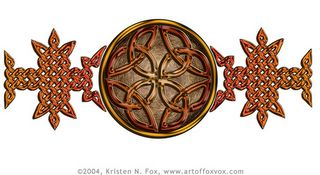
Let's look at something a bit longer ....
Go raibh tú daibhir i mí-áidh
Agus saibhir i mbeannachtaí
Go mall ag déanamh namhaid, go luath a déanamh carad,
Ach saibhir nó daibhir, go mall nó go luath,
Nach raibh ach áthas agat
Ón lá seo amach.
May you be poor in misfortune,
Rich in blessings,
Slow to make enemies,
quick to make friends,
But rich or poor, quick or slow,
May you know nothing but happiness
From this day forward.
Nice. This next one is a very popular toast in Ireland ---
Fad saol agat, gob fliuch, agus bás in Eirinn.
"Long life to you, a wet mouth, and death in Ireland."
The idea of dying away from home is unthinkable. We do, anyway.
Here's another:
Má dhéanann tu séitéireacht, go ndéana tú séitéireacht ar an mbás,
Má ghoideann tú, go ngoide tú croí mná;
Má throideann tú, go dtroide tú i leith do bhráthar,
Agus má ólann tú, go n-óla tú liom féin.
If you cheat, may you cheat death.
If you steal, may you steal a woman's heart.
If you fight, may you fight for a brother.
And if you drink, may you drink with me.
and another ....
Go bhfana í ngrá linn,
Iad siúd atá í ngrá linn.
Iad siúd nach bhfuil,
Go gcasa Dia a gcroíthe.
Agus muna gcasann Sé a gcroíthe
Go gcasa Sé caol na coise acu
Go n-aithneoimid iad as a mbacadaíl.
May those who love us,
Love us.
And those who do not love us,
May God turn their hearts.
And if He doesn't turn their hearts,
May He turn their ankles,
So we'll know them by their limping.
So if you break your leg or twist an ankle, be aware of those strange looks from your Irish neighbours.

Back in the pub --
Go raibh do ghloine lán go deo.
Go raibh láidir go breá
an dion thar do cheann.
Go raibh tú í Neamh,
leathúair os comhair
a bhfuil a fhíos ag an diabhal
atá tú bás.
May your glass be ever full.
May the roof over your head.
be always strong.
May you be in heaven
a half hour before
the devil knows you're dead.
And, finally, this is the one we say to our friends and family, particularly when we don't have many chances to meet and wonder when the next opportunity will arise.
Go mbeire muid beo ar an am seo aris!
(Go mary me byo ar anam sha areesh)
"May we be alive (and together) at this time next year."

Wednesday, October 12, 2005
223. Photos from JALT 2005
Click on photos to expand

Michael McCarthy tells it like it is
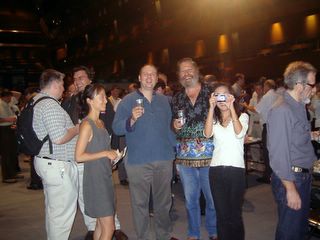
Robert and Rube at the party

JD & Craig Sweet

The international food fair ... where many of the best presentations took place!!

Chris & Brian at Safari Bar

So you want a shamrock, do you ...?

Captain Braindeath demonstrates non-vocal communication

David Nunan tells it like it is

Michael displays his other talents

Michael McCarthy tells it like it is

Robert and Rube at the party

JD & Craig Sweet

The international food fair ... where many of the best presentations took place!!

Chris & Brian at Safari Bar

So you want a shamrock, do you ...?

Captain Braindeath demonstrates non-vocal communication

David Nunan tells it like it is

Michael displays his other talents
Friday, October 07, 2005
Thursday, October 06, 2005
220. A Visit to my Aunt
Yallabay yallabay yallabay
puff puff
tiktik
hoo ... hoo ... hoo
ping-pong
- Boody boody boo!
- Em, boody bally boo!
- Chicatack?
- ah, bungum, bungum
- Plor vallton tras "tea"?
- ah, bungum
- torp lamper sha?
- bungum
- op lamper fram?
- ah, 2 fram
- plick!
puff puff
tiktik
hoo ... hoo ... hoo
ping-pong
- Boody boody boo!
- Em, boody bally boo!
- Chicatack?
- ah, bungum, bungum
- Plor vallton tras "tea"?
- ah, bungum
- torp lamper sha?
- bungum
- op lamper fram?
- ah, 2 fram
- plick!
219. Terror

The Raja Restaurant (Bali)
My eyes see a girl
The rucksack clings to my spine
Three seconds to live
---------------------------------------------
TV Correspondent
When bullets crack above your head
get down, or you'll be dead
the thing
(ppshangg .... ppshingg)
to remember, the thought
to bear in mind
(bbshangg)
is that people are unkind
from a sense of virtue.
(ppshooong)
They will kill you
(takatakatakatakatakataka)
but have no wish to hurt you.
Tuesday, October 04, 2005
218. Wait a Second!
(I was just reading a series of comments on one of the few weblists I subscribe to -- don't even ask because I'm not quite ready to tell you: heaving porn it wasn't -- and some young fella got involved in a discussion and his elders came down on him like a ton of bricks. Before I could reply the younker came back with a remark about old farts who didn't know what they were talking about. A slow smile spread over my lived-in face) :
This reminds me of how we used to annoy our own parents and the elders of our time. And did we ever -- I came of age in the late 60s. What goes around comes around. Time to put some manners on these cheeky kids -- yeah, right. They think they know it all. So did we. Nobody does. That's the great mystery and tragedy of life.
But things are sharper and more intense when you are young, when the world is still fresh, before the responsibilities and the consequences kick in. I think that's why we have such sympathy for people who burn out or get blown away while they are still in the opening stages of their lives: Romeo (16) and Juliet (14); Keats in his twenties; Rupert Brooke and Wilfrid Owen, poets of the Great War, also in their 20s; Jimi Hendrix, Janis Joplin and Jim Morrison; all the 19-year old soldiers (avg. age) who got killed in Vietnam -- and now in the Iraqi desert re-run of that nasty colonial war. They departed in their prime, too soon, but avoided all the doubts and physical failings of advancing age. I think sticking around and surviving is better, but that's a personal view: I should be dead ten times over but I ain't ... and I can't say I'm unhappy about that. For now.
Youth is evanescent. We all pass through it but none can hang on to it, except, perhaps the dead in the memory of their friends and family. As Laurence Binyon, recording the destruction of a generation in the First World War so memorably put it:
They shall grow not old, as we that are left grow old:
Age shall not weary them, nor the years condemn.
At the going down of the sun and in the morning
We will remember them.
More than a century before this, in 1789, Wordsworth captured the atmosphere of the early days of the French Revolution:
Bliss it was to be alive
But to be young was very heaven
And this sense of youthful fervour (and fever) always reminds me of the late 1960s between the Monterrey (Calif.) International Pop Music Festival in the summer of 1967 (Big Brother and the Holding Company with Janis Joplin, the Jimi Hendrix Experience, the Who, Otis Redding -- they all had their break-out moment here; the first serious showcase of "serious" rock music and the era's best peace/love/dove hippie fest) and the Beatles White Album which came out in the Fall of 1968. Wow!! That was one of the best times ever to be alive and to be young. But like the French Revolution things soon went rapidly downhill ... and we ended up with the pretty crappy 70s and 80s (and 90s?) ... well, downhill in terms of intensity and optimism and hope. All that stuff disappeared. We ended up with Nixon and Reagan and Bozo the Clown, liars and killers all. Clinton starts to look good by comparison. So does Peanut Carter.
I'm not knocking the young. What's the point? I'd like to be young again myself. On second thoughts, I'm not so sure I'd want to be young in THIS generation. Nobody can pick and choose. Sometimes you luck out.
This reminds me of how we used to annoy our own parents and the elders of our time. And did we ever -- I came of age in the late 60s. What goes around comes around. Time to put some manners on these cheeky kids -- yeah, right. They think they know it all. So did we. Nobody does. That's the great mystery and tragedy of life.
But things are sharper and more intense when you are young, when the world is still fresh, before the responsibilities and the consequences kick in. I think that's why we have such sympathy for people who burn out or get blown away while they are still in the opening stages of their lives: Romeo (16) and Juliet (14); Keats in his twenties; Rupert Brooke and Wilfrid Owen, poets of the Great War, also in their 20s; Jimi Hendrix, Janis Joplin and Jim Morrison; all the 19-year old soldiers (avg. age) who got killed in Vietnam -- and now in the Iraqi desert re-run of that nasty colonial war. They departed in their prime, too soon, but avoided all the doubts and physical failings of advancing age. I think sticking around and surviving is better, but that's a personal view: I should be dead ten times over but I ain't ... and I can't say I'm unhappy about that. For now.
Youth is evanescent. We all pass through it but none can hang on to it, except, perhaps the dead in the memory of their friends and family. As Laurence Binyon, recording the destruction of a generation in the First World War so memorably put it:
They shall grow not old, as we that are left grow old:
Age shall not weary them, nor the years condemn.
At the going down of the sun and in the morning
We will remember them.
More than a century before this, in 1789, Wordsworth captured the atmosphere of the early days of the French Revolution:
Bliss it was to be alive
But to be young was very heaven
And this sense of youthful fervour (and fever) always reminds me of the late 1960s between the Monterrey (Calif.) International Pop Music Festival in the summer of 1967 (Big Brother and the Holding Company with Janis Joplin, the Jimi Hendrix Experience, the Who, Otis Redding -- they all had their break-out moment here; the first serious showcase of "serious" rock music and the era's best peace/love/dove hippie fest) and the Beatles White Album which came out in the Fall of 1968. Wow!! That was one of the best times ever to be alive and to be young. But like the French Revolution things soon went rapidly downhill ... and we ended up with the pretty crappy 70s and 80s (and 90s?) ... well, downhill in terms of intensity and optimism and hope. All that stuff disappeared. We ended up with Nixon and Reagan and Bozo the Clown, liars and killers all. Clinton starts to look good by comparison. So does Peanut Carter.
I'm not knocking the young. What's the point? I'd like to be young again myself. On second thoughts, I'm not so sure I'd want to be young in THIS generation. Nobody can pick and choose. Sometimes you luck out.
Saturday, October 01, 2005
217. Up North
The air, ahh,
the air was clear and sweet
in Hakodate
and in the morning market
among crawling
red live crabs and enormous
half-dead fish
business arrangements
were consummated
in a flash of fingers
and I went, quietly,
well hidden from obstruction
for a welcome pint.
The teenage girls
were everywhere, uniformed,
scandalously short-skirted,
blissfully stupid;
they live in a strange world
of suspended hopes
and dreams, soft and fluffy,
soon to be shattered, soon held
to ridicule, not by their parents,
not by their friends, not by
useless teachers : no, no, but
by heartless stiff-
pricked boyfriends.
My God
just look at the bouncing beauty of nature;
you'd want to take it home with you
or at least take some photos,
you know what I mean?
This stuff is real, man,
this is fifteen shades of green
and I have tears,
no, come on, I have
real tears in my eyes
as I focus the sights
on my M-16
camera.
Oh, golly.
In other news
another drunken teacher
was fished out of the harbour
last night; he was half dead
but will never remember
that we met by the harbour wall
after the morning market
closed down, slowly,
not until 3 in the afternoon,
and that we went for several beers
and talked and talked
and he thought he knew it all
but didn't.
So when he passed out
all drunk and collapsed and trusting
I heaved him over the harbour wall
as my final answer to
his droning platitudes. Through no
fault of mine, I regret to report,
he survived; doubtless he will
continue to write his influential papers
and send me a card at Christmas.
I will send him a cordial response
mingled with the sharp feral
stink of regret.
The sea.
I love the sea.
The sea is a sight from my window.
I would never never never
(are you crazy?) get in a boat, though,
because waves get high.
I have seen this stuff before
when the waves swamp your boat
and you sink, and then you fall
into the water and then you DROWN.
This is not for me.
This is not my scene.
On the other hand
there are many other ways
to make a living, more interesting ways.
Here and there and over beyond
every fool can think of something,
every fool can wear gloves.
But when you slyly speak
from the side of your mouth
unaware of that concave mirror
at the back of the room
cold realization sinks in.
the air was clear and sweet
in Hakodate
and in the morning market
among crawling
red live crabs and enormous
half-dead fish
business arrangements
were consummated
in a flash of fingers
and I went, quietly,
well hidden from obstruction
for a welcome pint.
The teenage girls
were everywhere, uniformed,
scandalously short-skirted,
blissfully stupid;
they live in a strange world
of suspended hopes
and dreams, soft and fluffy,
soon to be shattered, soon held
to ridicule, not by their parents,
not by their friends, not by
useless teachers : no, no, but
by heartless stiff-
pricked boyfriends.
My God
just look at the bouncing beauty of nature;
you'd want to take it home with you
or at least take some photos,
you know what I mean?
This stuff is real, man,
this is fifteen shades of green
and I have tears,
no, come on, I have
real tears in my eyes
as I focus the sights
on my M-16
camera.
Oh, golly.
In other news
another drunken teacher
was fished out of the harbour
last night; he was half dead
but will never remember
that we met by the harbour wall
after the morning market
closed down, slowly,
not until 3 in the afternoon,
and that we went for several beers
and talked and talked
and he thought he knew it all
but didn't.
So when he passed out
all drunk and collapsed and trusting
I heaved him over the harbour wall
as my final answer to
his droning platitudes. Through no
fault of mine, I regret to report,
he survived; doubtless he will
continue to write his influential papers
and send me a card at Christmas.
I will send him a cordial response
mingled with the sharp feral
stink of regret.
The sea.
I love the sea.
The sea is a sight from my window.
I would never never never
(are you crazy?) get in a boat, though,
because waves get high.
I have seen this stuff before
when the waves swamp your boat
and you sink, and then you fall
into the water and then you DROWN.
This is not for me.
This is not my scene.
On the other hand
there are many other ways
to make a living, more interesting ways.
Here and there and over beyond
every fool can think of something,
every fool can wear gloves.
But when you slyly speak
from the side of your mouth
unaware of that concave mirror
at the back of the room
cold realization sinks in.
Subscribe to:
Comments (Atom)








